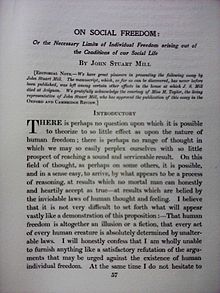- On Social Freedom
-
On Social Freedom
Title page of Mill's On Social Freedom featured for the first time in the Oxford and Cambridge Review, June of 1907.Author(s) John Stuart Mill Country England Language English Subject(s) Individual and Societal Freedom Genre(s) Philosophy Publisher Archibald Constable & Co. Ltd. Publication date 1907 Media type Print Pages 57-83 ISBN NA On Social Freedom: or the Necessary Limits of Individual Freedom Arising Out of the Conditions of Our Social Life is an essay regarding individual and societal freedom written by British philosopher John Stuart Mill.[1] For some thirty odd years after his death, the essay was among other possessions left in the home at which Mill died in Avignon, France. It was not until June 1907 that this essay was released to the public. It was published as a special article in the Oxford and Cambridge Review[2] in early June. The original manuscript, which was released courtesy of Miss M. Taylor, at the time the living representative of Mill, was merely a preamble of an anticipated longer work on the subject, which was never thoroughly completed in the form originally intended by Mill.
Contents
Stance on Freedom
The essay itself was written not to answer any previously unanswerable questions about freedom, but rather to distinguish the nature of freedom with regards to individuals and society. Mill writes early in the essay, “I am not at present concerned with arguments for or against the actual existence of human freedom… What I have to say is exclusively addressed to those who admit the existence of human freedom…” One of the first distinguishable, definitive, notions Mill asserts is that human beings cannot conceive of any exercise of freedom other than that of action. “A man who is free, is free to act; the man who is not free to act possesses no such freedom as we can form any conception of.” He also argues that individual freedom, in itself, is a relative conception, definitive only in a case by case manner. He, furthermore, addresses the (personally entitled) “Individualist Theory of Freedom,” which he states is very prevalent amongst men at the time. This theory states that in order to obtain perfect freedom, each person should be assigned his own individual sphere of activity in which he can do what he pleases without interruption, so long as all he does is maintained within the assigned sphere. Mill contests this theory and attempts to clarify its impossible nature.
Perhaps the central argument Mill makes is on the essential nature of freedom, in which freedom is not inflexible, prearranged, or universal. He states, “I am more free in one case, and less free in another case.” Regarding personal choice as being a brand of true freedom, he states that simply because one has choices does not make him completely free, because those choices are limited, not boundless; they are within the realm of something which someone cannot possibly have the freedom to control.
Mill’s On Social Freedom brings to light the implications and intricate nature of freedom as it pertains to both the individual and the society in which those individuals live. It confronts a subject that has been at the root of human inquiry since the creation of society, simultaneously challenging and encouraging the individual to question the true meaning of freedom.
Essay Divisions
The essay is divided into four sections, each of which addresses certain aspects of freedom. The first section is simply an introduction, in which Mill establishes his intentions. The next three sections have to do with the generally considered nature of freedom, individualistic freedom, and, what he considered, the essential nature of freedom, respectively.
Introductory
General Considerations regarding the Nature of Freedom
The Individualist Theory of Freedom
The Essential Nature of Freedom
References
- ^ Dawson, Oswald. "On Social Freedom." In Oxford and Cambridge Review. London: Archibald Constable & Co. Ltd., 1907. 57-83.
- ^ Oxford and Cambridge Review on Google Books, "John Stuart Mill: On Social Freedom: or the Necessary Limits of Individual Freedom Arising Out of the Conditions of Our Social Life", June 1907
External links
Categories:- John Stuart Mill
- Social philosophy literature
- Unfinished creative works
- Modern philosophical literature
Wikimedia Foundation. 2010.

